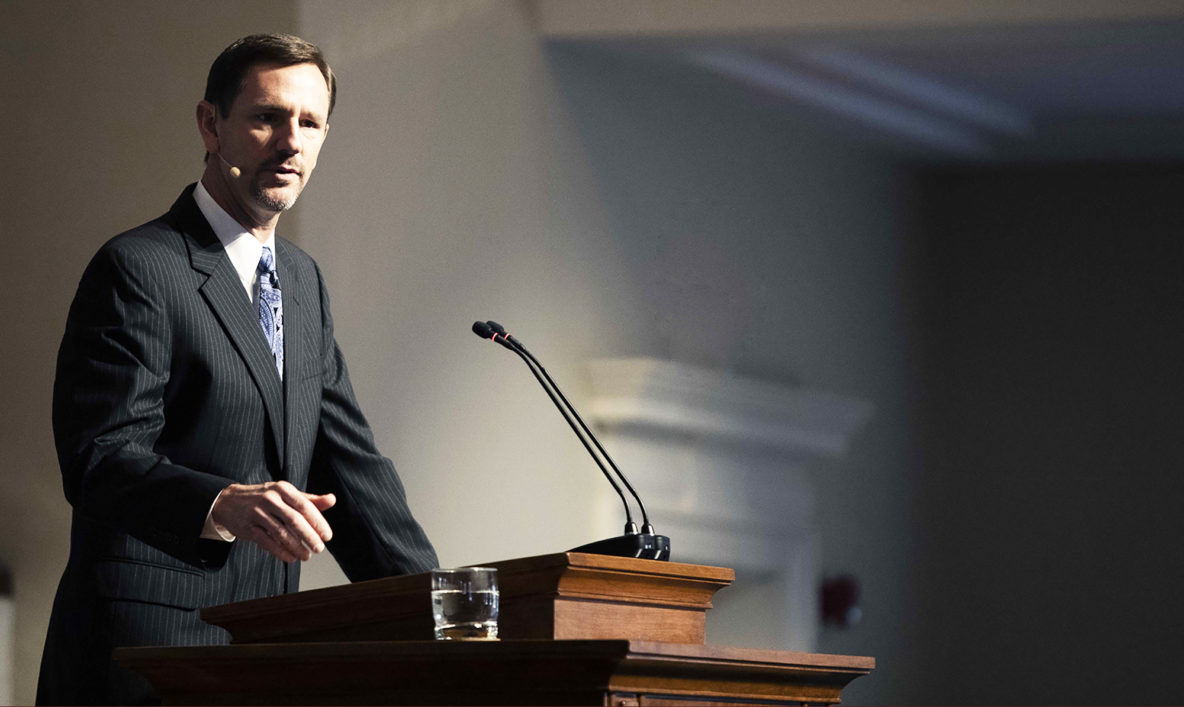LOUISVILLE, Ky. (BP) — A glorious vision of people from all nations worshiping God should inspire all ministry and mission, says Paul Chitwood, president of the International Mission Board.
Chitwood spoke during Southern Baptist Theological Seminary’s chapel, April 18. He is a two-time graduate of the seminary, having earned both his master of divinity and doctorate of philosophy at the school.
Chitwood preached from Revelation 7:9-10, which he said is a “glorious culmination” of God’s plan to claim his church from every tribe, tongue, people and nation. Speaking the day before Good Friday, when Christians around the world remember the death and burial of Jesus Christ before his resurrection on Sunday, Chitwood said the apostle John’s vision in Revelation 7 is the fulfillment of Christ’s work and the driving force behind the mission of the church 2,000 years later.
“This vision of heaven … is not only the culmination of the events of Holy Week, it is what drives the ministry and mission of the church to this very day and will continue to drive the ministry and mission of the church until the Lord Jesus comes to claim his church. That vision is what we must look toward to, what we give our lives to, and — if called upon — what we give our lives for.”
The vision of heaven is inclusive, Chitwood said. The multitude John sees will not be made up of a crowd of people from some nations or most nations, but every nation. If the vision included just some or most people and languages, Chitwood said, Christians could take it easy.
“If that’s the vision, then you can go home,” he said to the students, faculty, and staff of Southern Seminary. “All the frustrations and heartaches of serving in churches and seminaries or spending your life on the mission fields of the world are for nothing if the vision has already been fulfilled. But they aren’t for nothing.
“The frustration and heartaches of local church ministry are necessary, as is doing whatever it takes to get the Gospel to the very ends of the earth, because the adjectives [in this passage] say ‘every’ and ‘all.’ The vision has not yet been fulfilled, and it is for the fulfillment of this vision that this institution was birthed and exists today.”
In his sermon, Chitwood focused on the reasons why Christians should pay attention to the vision of the apostle John recorded in Revelation 7, asking questions like, “who?” “where?” “how?” and “why?” These questions reveal the nature of the vision and its meaning for believers today, he said.
The “who?” question is answered by the inclusive nature of the vision, bringing together people from every tribe and nation, while the “where” and “how” questions are addressed by the people’s presence before the throne of God, dressed in white robes. All these people do not gather before the throne because they deserve to. They are brought from all over the world by the blood of Jesus Christ alone, who paid their debt of sin and gave them garments of righteousness, he said.
“How can a people so stained with guilt be here in the vision, clothed in white robes? That is the ‘how’ of salvation (in addition to ‘who’ and ‘where’),” Chitwood said. “Prophecy came to pass and law was fulfilled. A curse was carried, a debt was paid, judgment was carried out and wrath was satisfied. His wounds brought us healing, he atoned for our sin, a messiah came, a lamb was slain, his death brought life, and he has become the first fruits of the resurrection.”
Christians, empowered by the Holy Spirit, can boldly share the Gospel and take its message to the ends of the earth because they know this vision will be fulfilled, Chitwood said. They can participate in God’s great victory.
“You and I know that the vision will be fulfilled, and the great privilege we have is to be part of it,” he said.
Audio and video from the chapel address will soon be available at Southern Equip.Reported by Southern Baptist Theological Seminary Communications.

